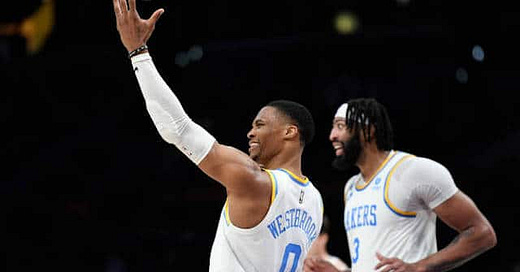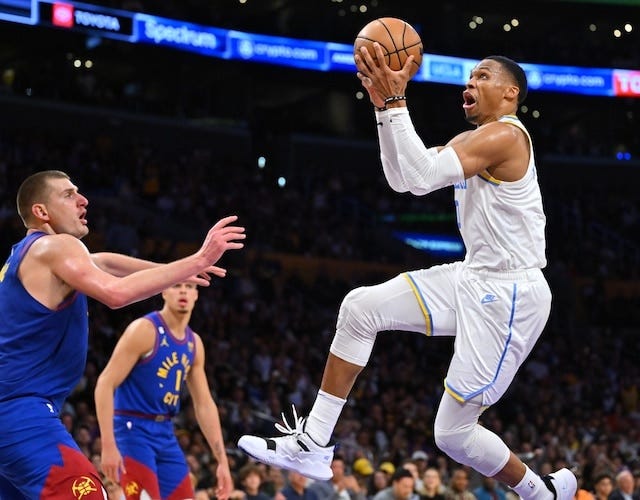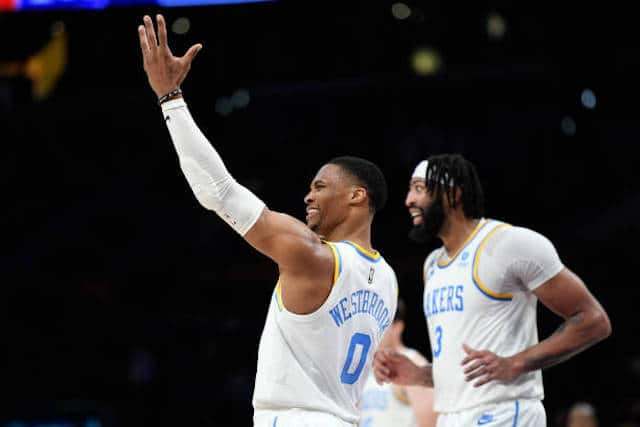Sometimes, a game is more than just a game. Most nights, team A plays team B, one of them wins, and move on to the next one. Such is the grind of a professional sports season.
But every once in a while there’s a night when something extraordinary happens in or around the game, something that brings a shared experience1 that can connect people in an incredibly powerful way.
For Russell Westbrook and a legion of Lakers fans, that connection occurred on Sunday night. For the first time since his arrival in L.A., Westbrook was accepted by his hometown crowd as their interests aligned: the purple and gold faithful were desperate to see a win, and Westbrook’s performance was a major factor in making it happen.
What a difference it made.
Westbrook’s history with Lakers supporters has been rocky at best. Basketball fans are acutely aware of just how important the game-within-the-game is; how managing contracts and striking the right deals on the trade market can go a long way toward determining a team’s fate.
The Westbrook trade that saw LA send out Kyle Kuzma, Kentavious Caldwell-Pope, and Montrezl Harrell2 along with a first-round pick to acquire the former MVP has, overall, been disastrous. Westbrook’s contract makes him one of the highest-paid players in the league while his production no longer met that lofty bar. The combination of Westbrook’s poor play, his contract, and the level to which it sapped the Lakers’ ability to build out a roster around LeBron James and Anthony Davis drew the frustrations of fans as their team sank from the top of the NBA mountain down to the base.
It was a horrifying fall from grace, and while Westbrook isn’t to blame for the Lakers’ decision to trade for his contract, he became the focal point of the team’s maddening struggles.
His shooting percentages sunk to baffling lows while costly turnovers and embarrassing defensive lapses caused fans to clamor for a trade to send him somewhere, anywhere else. They gasped or shouted “No!” when he would take an ill-advised shot, tired of seeing possessions wasted in a league obsessed with efficiency.
It was a bad situation all around, and the only solution appeared to be a trade. Westbrook’s contract was hampering their ability to build a competitive team and his play on the court compounded the problem. If the Lakers wanted to save the season they would need to move Westbrook, with every other team in the NBA determined to make LA pay dearly for doing so.
Then, on Sunday, hope arrived. Head coach Darvin Ham had moved Westbrook into a reserve role off the bench with the goal of staggering his minutes with those of LeBron James as well as allowing Westbrook to run rampant over the second unit of the Lakers’ opponents. The test run against the Wolves on Friday looked promising despite a loss, so Ham stuck with Westbrook in a 6th Man role for Sunday’s must-win matchup with the Nuggets.
While Westbrook may not be thrilled with coming off the bench after spending most of his career as a 1A superstar and clear starter, the results are hard to argue with: he was an efficient 50% from the field and from 3, scoring 18 points to go along with 8 rebounds and assists while registering a team-high +18 in his minutes on the floor.
More importantly, the Lakers won their first game of the season and Westbrook played a pivotal role in doing so. It was such a meaningful moment that Ham teared up a bit after the game when asked about it in his postgame interview.
It was only a week ago when Westbrook drew the harshest criticism yet from LA fans. He checked back into a game against the Blazers in the 4th quarter and made critical mistakes down the stretch that contributed to a horrifying collapse. Media pundits and fans alike questioned whether Westbrook should simply be sent home until the Lakers can find an acceptable trade, asserting that he could no longer help the team win games.
That’s where things stood, with legitimate arguments being made that Westbrook should be paid $47 million to simply go away and the Lakers would be better off because of it.
Instead, Ham stood by Westbrook, believing that a bench role would get the best out of him. For at least one night, it worked. Instead of boos and exasperated sighs with every shot, the LA crowd roared their approval when Westbrook checked into the game in the 4th. They believed in him and fed off of his energy just as he fed off theirs, whirling to the basket and whipping passes to open shooters3 to thunderous applause.
This was the story we had so badly wanted to tell, of the native son returning to Los Angeles, connecting with his city, and helping lead the team that has its heart to victory.
The future remains uncertain. Will Westbrook be able to permanently hit this level of play off the bench or was it a one-off? The answer to that question will go a long way towards determining the Lakers’ trade endeavors4 this season, but that’s for another day.
For at least one night, it was heartwarming to see Westbrook perform at a high level and the city responded with an immediate embrace.
The Story Behind “See Ya”
One of the things that I want to do with this substack is let people in a bit more; show them the behind-the-scenes part of what I do covering the Lakers and the NBA at large as well as how I got here. Some things just naturally don’t come up during a show, and one of them is the sign-off that our audience has been hearing for years now: “See ya, and stay safe”.
There is actually a story behind it that’s important to me because frankly, I wouldn’t have this career without it.
The “stay safe” bit is pretty self-explanatory: I added it when the pandemic took off in 2020 and it’s just stuck. Maybe I’ll remove it at some point but it’s a habit now.
“See ya”, on the other hand, goes all the way back to the start of it all. Way back, as in the year 1999. The Lakers were one year away from winning a title, boy bands and Nu Metal was everywhere, and the MCU was nearly a decade away from existing.
I went to Mission Viejo High School, the home of the Diablos. It was my junior year and I decided to take a TV production class, the intro level course, as an elective on a whim. I don’t think it was even one of my top choices, but it was where they had room so I went along with it.
In that class, I learned the basic principles of shooting and editing video, primarily working on a reel-to-reel VHS editing deck (like I said, a LONG time ago). I completed a number of projects over the semester, and for my final exam I got to edit whatever topic I wanted, so I did a sports video featuring the top goalkeepers in professional soccer, which was my position on the school team.
I got an A in the class and that was that, I headed off for summer leaving the video and audio world behind.
Or so I thought.
When I got my schedule for my senior year, I found that I had been enrolled in another video production class despite not requesting it. I went to the teacher, John Harnack, to see if he knew what was going on, and frankly, to ask if he would drop me so I could take something else.
It was then that I found out that he had requested that I be put back into his video production class, but this time the advanced class, effectively allowing me to skip a level. I couldn’t believe it because I knew what moving to the advanced class meant, and it was a big deal.
You see, the advanced class was responsible for producing a weekly show that the entire school and surrounding community would see. A show called “Diablo Heat”.
I immediately withdrew my request to drop the class.
I had no idea this was even a possibility, to skip a course, or that I was even a candidate to do so, but that decision changed my life forever. It meant using all of the top-of-the-line cameras, the professional-quality studio, the lone digital editing system that the school owned, writing scripts, storyboarding, and tons more that we weren’t ready for in the introductory class.
It felt like I suddenly had a real job in the business, and more importantly, everyone in the class treated the show as such. Looking back now it was a minor school TV show that might be seen by a few thousand people tops, but back then, I felt amazed that so many would get to see my work and felt a real sense of responsibility for making it the best it could be.
A number of people who worked on the show are still involved in the field today. Brianna Keilar, who now is a host for CNN, was a reporter the year before my stint. Desi Davar and Jordan Rawlins, who were the hosts during my season, are both still in show business.
Maybe a bit ironic now given my current job, but I was never on camera; instead my job was to do the behind-the-scenes work. My love of writing translated well to scripts, and I was often leaned upon to write the dialog for the hosts to read as well as shoot and edit stories for the show.
We did, however, have a problem: ending each show. Every year the show had a new hosting duo, typically a guy and a girl, and each year had its own unique sign-off. We tried a number of different versions with Jordan and Desi, and the more complicated we made it, the less genuine it felt.
Growing tired of all of the swings and misses and working under a deadline, we fell back onto the simple and effective “see ya” while our hosts would wave to the camera.
Throughout the year we had a blast producing the show, and I often juggled athletics with putting in work in the editing room. I even recall staying all night at one point so that “Diablo Heat” would air on time the next morning after a hard drive disaster. As a group, we always managed to get the job done, leaning on each other when need be.
Producing the show was a true team environment; it reminded me so much of what I felt competing in athletics all my life. We had such a sense of accomplishment every Friday when our new episode would air.
While I didn’t initially pursue video production straight out of high school despite having offers to do so, the experience of working on “Diablo Heat” never left me. It’s probably why I felt comfortable enough to get a mic and start the Lakers Nation Podcast and eventually get on camera for our YouTube channel, where we’ve had tremendous growth.
So for me, every time I finish my show and say the words “see ya”, it’s a subtle shoutout to where it all truly began. A class that I took way back when showed me a whole new world. A world that eventually, after a long and winding road, became my career.
This is true throughout history. Major events, both positive and negative, that are shared by groups of people tend to bring them closer together. Think Pearl Harbor, the moon landing, the Miracle on Ice, 9/11, etc. Those are massive events with sweeping impacts but a similar effect is seen among sports fans as well.
Alex Caruso is also seen as a casualty of the trade, though LA had every opportunity to keep him, they just didn’t want to pay the price.
LA finally had their progression to the mean game, shooting 43% from 3 after being dead last by a mile in the category through the first 5 games.
I’ve already had scores of Lakers fans asking about making a trade without Westbrook included, something that essentially never happened prior to the Nuggets game.








I'm still learning the area. I grew up elsewhere, but when I was an undergrad at UCI, I got into some really good pick up games at the bball courts at Costeau Park. Now that I live by Costeau Park, I see those high level games are no longer happening.
Also enjoyed your latest Lakers Nation video. I feel like if the Lakers make a trade with Charlotte for Rozier/Hayward, they shouldn't have to give up any picks because of the salary cap relief. If they are going to trade the picks, Turner/Hield makes the most sense. Would love to get Jalen McDaniels from Charlotte - 6'9", highly mobile defender, shooting 61% from 3 on 3.3 attempts. Not sure Charlotte is ready to part with him, though.
Nice! I didn't know you were a south Orange County guy. I'm currently raising my kids just down Alicia Pkwy on the other side of the 5 in Laguna Hills.